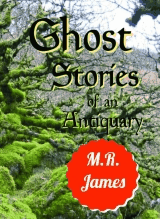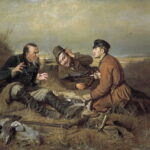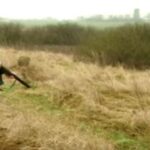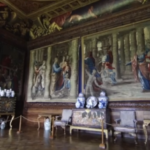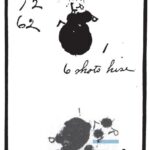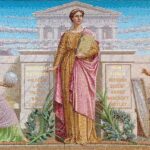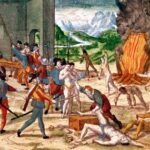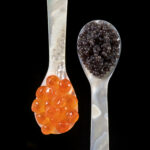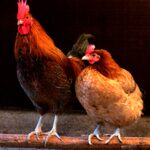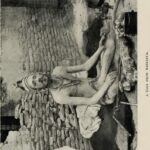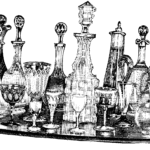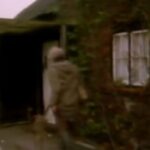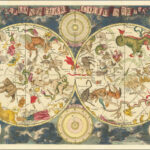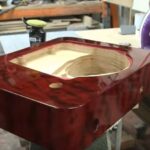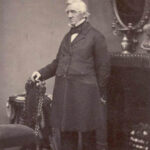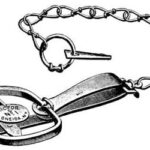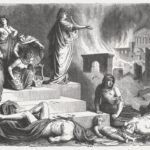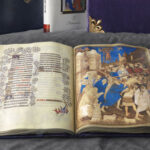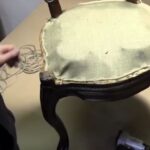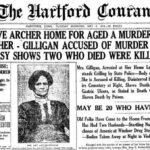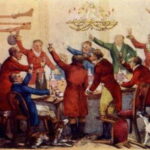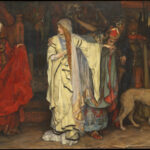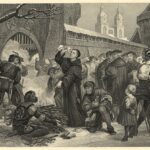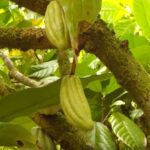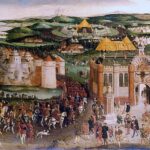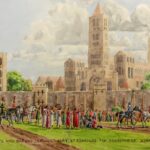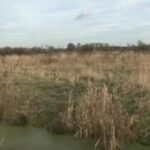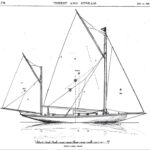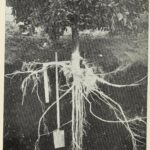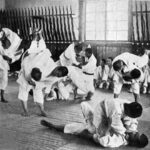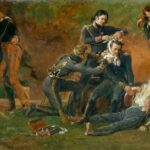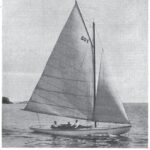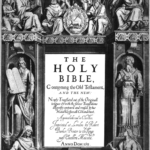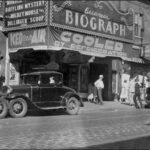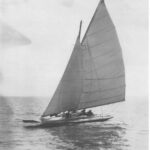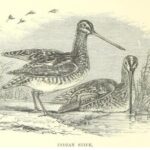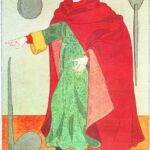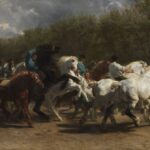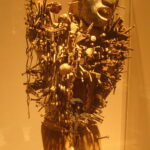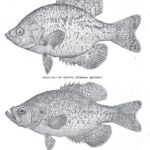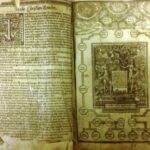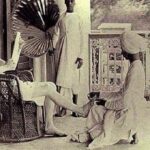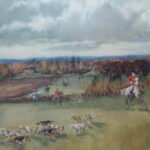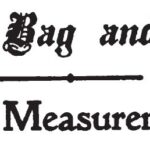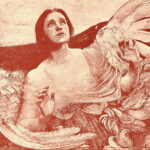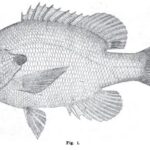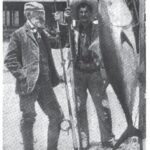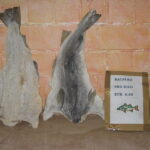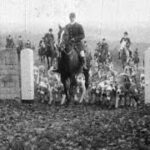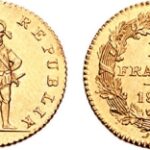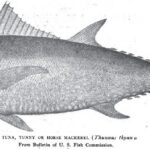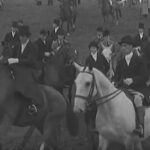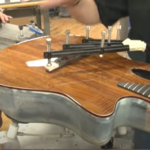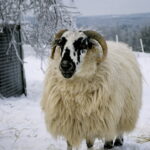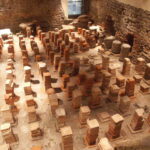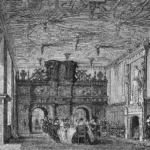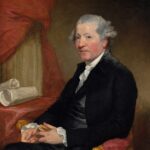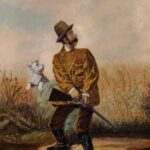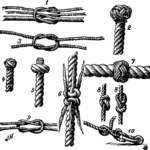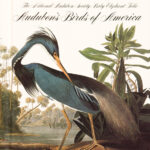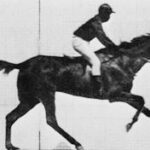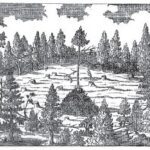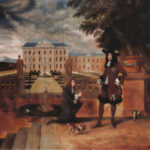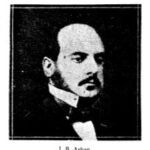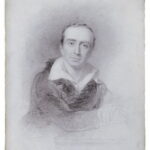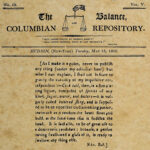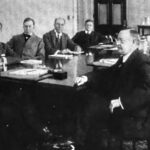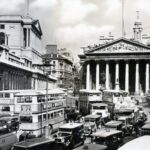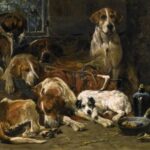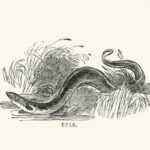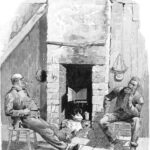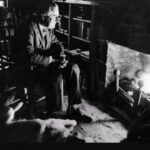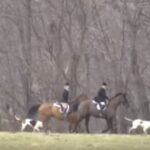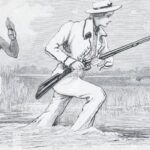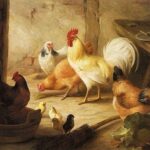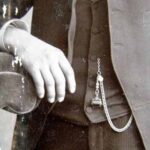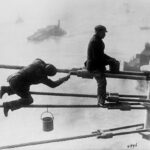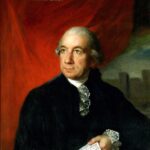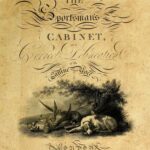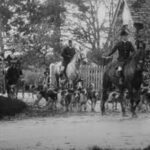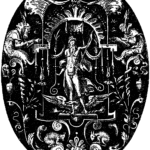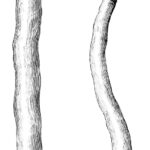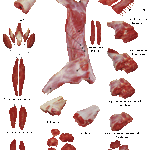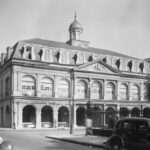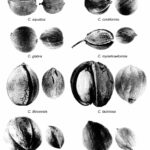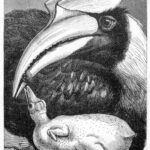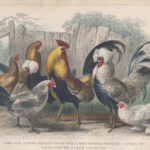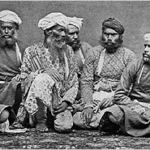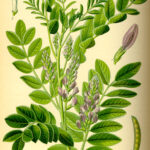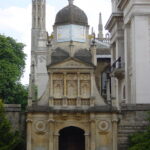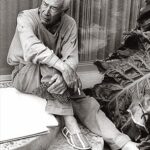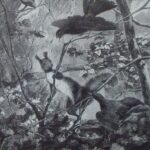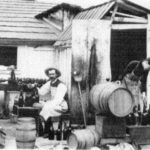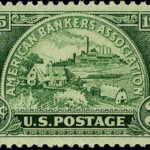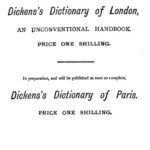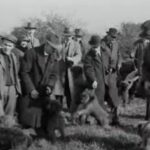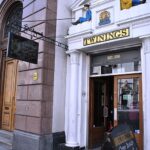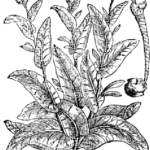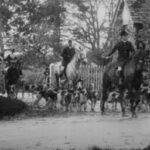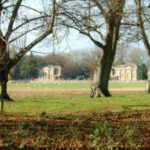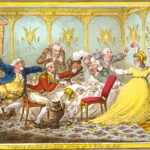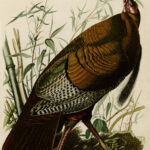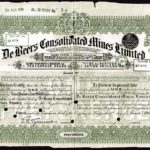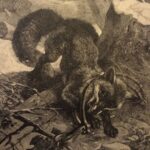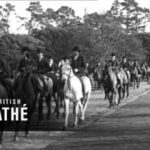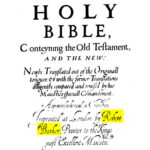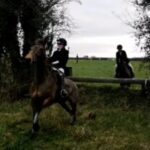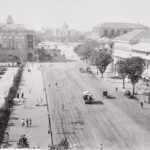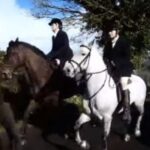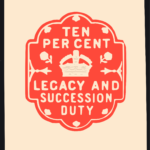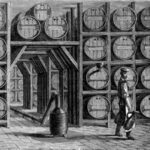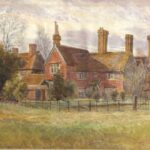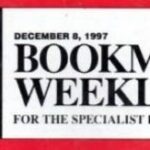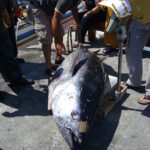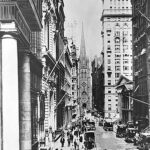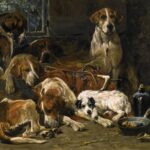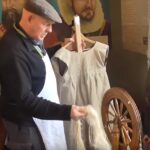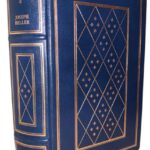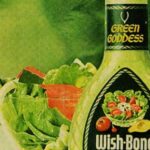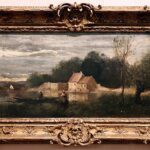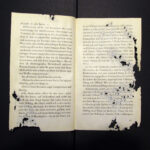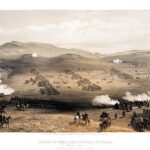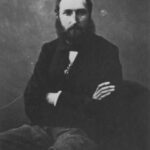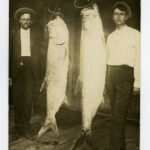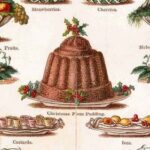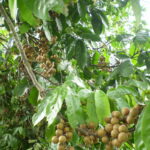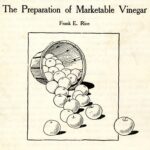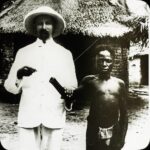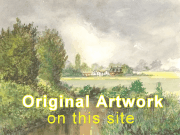The Billesden Coplow Run May 9th, 2021 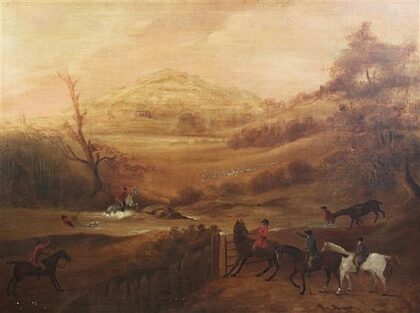 *note – Billesdon and Billesden have both been used to name the hunt. *note – Billesdon and Billesden have both been used to name the hunt.
BILLESDEN COPLOW POEM
[From “Reminiscences of the late Thomas Assheton Smith, Esq”]
The run celebrated in the following verses took place on the 24th of February, 1800, when Mr. Meynell hunted Leicestershire, and has since been known as the Billesden Coplow Run. It will only cease to interest, says a writer in the Sporting Magazine, when the grass shall grow in winter in the streets of Melton Mowbray. They found in the covert from which the song takes its name, thence to Skeffington Earths, past Tilton Woods, by Tugby and Whetstone, where the field, as many as could get over, crossed the river Soar. Thence the hounds changing their fox, carried a head to Enderby Gorse, where they lost him, after a chase of two hours and fifteen minutes, the distance being twenty-eight miles. A picture descriptive of this famous run was painted by Loraine Smith, Esq., who was one of the few who got over the river, and was until very lately in the possession of Robert Haymes, Esq., of Great Glenn, Leicestershire. In this painting, which shows the field in the act of crossing the Soar, we see Mr. Germaine, who has just crossed it, and was the only one out that day who did so on horseback. Mr. Musters is in the middle of the stream, and on the point of throwing himself off his horse, who is too much distressed to carry him over. The other horsemen in the picture are Jack Raven the huntsman, Lord Maynard, and his servant, who are all three coming up towards the stream. Mr. Loraine Smith, ” the Enderby Squire,” who of course well knows the locality, is crossing a ford on foot, and leading his horse, higher up the stream. The hounds are seen ascending the hill on the opposite side, in full cry, leaving Enderby village and church to the left. The song was written by the Rev. Robert Lowth, son of the eminent Bishop of London of that name. The reverend divine was one of the field, being on a visit at Melton at that time, and wrote the song at the request of the Honourable George Germaine, brother of Lord Sackville, afterwards Duke of Dorset, in consequence of some in correct accounts of the run which had been published.
POEM ON THE FAMOUS BILLESDEN COPLOW RUN
By the Rev. Robert Lowth
” Quseque ipse miserrima vidi,
Et quorum pars magna fui.”
With the wind at north-east, forbiddingly keen,
The Coplow of Billesden ne’er witness’d, I ween,
Two hundred such horses and men at a burst,
All determined to ride—each resolved to be first.
But to get a good start over-eager and jealous,
Two thirds, at the least, of these very fine fellows
So crowded, and hustled, and jostled, and cross’d,
That they rode the wrong way, and at starting were lost.
In spite of th’ unpromising state of the weather,
Away broke the fox, and the hounds close together :
A burst up to Tilton so brilliantly ran,
Was scarce ever seen in the mem’ry of man.
What hounds guided scent, or which led the way,
Your bard—to their names quite a stranger—can’t say ;
Though their names had he known, he is free to confess,
His horse could not show him at such a death-pace.
Villiers, Cholmondeley, and Forester made such sharp play,
Not omitting Germaine, never seen till to-day :
Had you judged of these four by the trim of their pace,
At Bibury you’d thought they’d been riding a race.
But these hounds with a scent, how they dash and they fling,
To o’er-ride them is quite the impossible thing ;
Disdaining to hang in the wood, through he raced,
And the open for Skeffington gallantly faced ;
Where headed and foil’d, his first point he forsook,
And merrily led them a dance o’er the brook.
Pass’d Galby and Norton, Great Stretton and Small,
Right onward still sweeping to old Stretton Hall ;
Where two minutes’ check served to show at one ken
The extent of the havoc ‘mongst horses and men.
Such sighing, such sobbing, such trotting, such walking ;
Such reeling, such halting, of fences such baulking ;
Such a smoke in the gaps, such comparing of notes ;
Such quizzing each other’s daub’d breeches and coats :
Here a man walk’d afoot who his horse had half kill’d,
There you met with a steed who his rider had spill’d :
In short, such dilemmas, such scrapes, such distress,
One fox ne’er occasion’d, the knowing confess.
But, alas ! the dilemmas had scarcely began,
On for Wigston and Ayleston he resolute ran,
Where a few of the stoutest now slacken’d and panted,
And many were seen irretrievably planted.
The high road to Leicester the scoundrel then cross’d,
As Tell-tale 1 and Beaufremont 2 found to their cost ;
1 Mr. Forester’s horse. 2Mr. Maddock’s horse.
And Villiers esteem’d it a serious bore,
That no longer could Shuttlecock1 fly as before ;
Even Joe Miller’s2 spirit of fun was so broke,
That he ceased to consider the run as a joke.
Then streaming away, o’er the river he splashed,—
Germaine close at hand, off the bank Melon3 dash’d.
Why so stout proved the Dun, in a scamper so wild ?
Till now he had only been rode by a Child.4
After him plunged Joe Miller with Musters so slim,
Who twice sank, and nearly paid dear for his whim,
Not reflecting that all water Melons must swim.
Well soused by their dip, on they brush’d o’er the bottom,
With liquor on board, enough to besot ’em.
But the villain, no longer at all at a loss,
Stretch’d away like a d—I for Enderby Gorse :
Where meeting with many a brother and cousin,
Who knew how to dance a good hay in the furzen ;
Jack Raven5 at length coming up on a hack,
That a farmer had lent him, whipp’d off the game pack.
Running sulky, old Loadstone 6 the stream would not swim,
No longer sport proving a magnet to him.
Of mistakes, and mishaps, and what each man befel,
Would the muse could with justice poetical tell !
Bob Grosvenor on Plush7—though determined to ride—
Lost, at first, a good start, and was soon set aside ;
Though he charged hill and dale, not to lose this rare chase,
On velvet, Plush could not get a footing, alas !
To Tilton sail’d bravely Sir Wheeler O’Cuff,
Where neglecting, through hurry, to keep a good luff,
1 Lord Villiers’ horse. 2 Mr. Musters’ horse.
3 Mr. Germaine’s horse. 4 Formerly Mr. Child’s.
5 The name of the huntsman. 6The huntsman’s horse.
7 Mr. Robert Grosvenor’s horse.
To leeward he drifts—how provoking a case !
And was forced, though reluctant, to give up the chase.
As making his way to the pack’s not his forte,
Sir Lawley,1 as usual, lost half of the sport.
But then the profess’d philosophical creed,
That ” all’s for the best,”—of Master Candide,
If not comfort Sir R., reconcile may at least ;
For, with this supposition, his sport is the best.
Orby Hunter, who seem’d to be hunting his fate,
Got falls, to the tune of no fewer than eight.
Bashan’s king,2 upon Glimpse,3 sadly out of condition,
Pull’d up, to avoid of being tired the suspicion.
Og did right so to yield ; for he very soon found,
His worst had he done, he’d have scarce glimpsed a hound.
Charles Meynell, who lay very well with the hounds,
Till of Stretton he nearly arrived at the bounds,
Now discover’d that Waggoner4 rather would creep,
Than exert his great prowess in taking a leap ;
But when crossing the turnpike, he read ⇒ ” Put on here,”
‘Twas enough to make any one bluster and swear.
The Waggoner feeling familiar the road,
Was resolved not to quit it ; so stock still he stood.
Yet prithee, dear Charles ! why rash vows will you make,
Thy leave of old Billesden5 to finally take ?
Since from Legg’s Hill,6 for instance, or perhaps Melton
Spinney,
If they go a good pace, you are beat for a guinea !
1 Sir Robert Lawley, called Sir Lawley in the Melton dialect.
2 Mr. Oglander, familiarly called Og. 3 Mr. Oglander’s horse.
4 Mr. C. Meynell’s horse.
5 He had threatened never to follow the hounds again from Billesden,
on account of his weight.
6 A different part of the hunt.
‘Tis money, they say, makes the mare to go kind ;
The proverb has vouch’d for this time out of mind ;
But though of this truth you admit the full force,
It may not hold so good of every horse.
If it did, Ellis Charles need not bustle and hug,
By name, not by nature, his favourite Slug.1
Yet Slug as he is—the whole of this chase
Charles ne’er could have seen, had he gone a snail’s pace.
Old Gradus,2 whose fretting and fuming at first
Disqualify strangely for such a tight burst,
Ere to Tilton arrived, ceased to pull and to crave,
And though freshisA at Stretton, he stepp’d a pas grave !
Where, in turning him over a cramp kind of place,
He overturn’d George, whom he threw on his face ;
And on foot to walk home it had sure been his fate,
But that soon he was caught, and tied up to a gate.
Near Wigston occurr’d a most singular joke,
Captain Miller averr’d that his leg he had broke,—
And bemoan’d, in most piteous expressions, how hard,
By so cruel a fracture, to have his sport marr’d.
In quizzing his friends he felt little remorse,
To finesse the complete doing up of his horse.
Had he told a long story of losing a shoe,
Or of laming his horse, he very well knew
That the Leicestershire creed out this truism worms,
“Lost shoes and dead beat are synonymous terms.”
So a horse must here learn, whatever he does,
To die game—as at Tyburn—and ” die in his shoes.”
Bethel Cox, and Tom Smith, Messieurs Bennett and
Hawke,
Their nags all contrived to reduce to a walk.
1 Mr. Charles Ellis’s horse. 2.Mr. George Ellis’s horse
Maynard’s Lord, who detests competition and strife,
As well in the chase as in social life,
Than whom nobody harder has rode in his time,
But to crane here and there now thinks it no crime,
That he beat some crack riders most fairly may crow,
For he lived to the end, though he scarcely knows how.
With snaffle and martingale held in the rear,
His horse’s mouth open half up to his ear ;
Mr. Wardle, who threaten’d great things over night,1
Beyond Stretton was left in most terrible plight
Too lean to be press’d, yet egg’d on by compulsion,
No wonder his nag tumbled into convulsion.
Ah ! had he but lost a fore shoe, or fell lame,
‘Twould only his sport have curtail’d, not his fame.
Loraine,2—than whom no one his game plays more safe,
Who the last to the first prefers seeing by half,—
What with nicking 3 and keeping a constant look-out,
Every turn of the scent surely turn’d to account.
The wonderful pluck of his horse surprised some,
But he knew they were making point blank for his
home.
” Short home ” to be brought we all should desire,
Could we manage the trick like the Enderby Squire.4
Wild Shelley,5 at starting all ears and all eyes,
Who to get a good start all experiment tries,
Yet contrived it so ill, as to throw out poor Gipsy,6
Whom he rattled along as if he’d been tipsy,
1 Said to have threatened that he would beat the whole field.
2Mr. Loraine Smith. 3 A term of reproach.
4Where Mr. Loraine Smith lives 5 Usually very grave.
6 Sir John Shelley’s mare.
To catch them again ; but, though famous for speed,
She never could touch1 them, much less get a lead.
So dishearten’d, disjointed, and beat, home he swings,
Not much unlike a fiddler hung upon strings.
An H. H.2 who in Leicestershire never had been,
So of course such a tickler ne’er could have seen,
Just to see them throw off, on a raw horse was mounted,
Who a hound had ne’er seen, nor a fence had confronted.
But they found in such style, and went off at such score,
That he could not resist the attempt to see more :
So with scrambling, and dashing, and one rattling fall,
He saw all the fun, up to Stretton’s white Hall.
There they anchor’d, in plight not a little distressing—
The horse being raw, he of course got a dressing.
That wonderful mare of Vanneck’s, who till now
By no chance ever tired, was taken in tow :
And what’s worse, she gave Van such a devilish jog
In the face with her head, plunging out of a bog,
That with eye black as ink, or as Edward’s famed Prince,
Half blind has he been, and quite deaf ever since.
But let that not mortify thee, Shackaback ; 3
She only was blown, and came home a rare hack.
There Craven too stopp’d, whose misfortune, not fault,
His mare unaccountably vex’d with string-halt ;
And when she had ceased thus spasmodic to prance,
Her mouth ‘gan to twitch with St. Vitus’s dance.
1 Melton dialect for “overtake.”
2 These initials may serve either for Hampshire hog or Hampshire
Hunt.
3 A name taken from Blue Beard, and given to Mr. Vanneck by his
Melton friends.
But how shall described be the fate of Rose Price,
Whose fav’rite white gelding convey’d him so nice
Through thick and through thin, that he vow’d and
protested1
No money should part them, as long as life lasted ?
But the pace that effected which money could not :
For to part, and in death, was their no distant lot.
In a fatal blind ditch Carlo Khan’s2 powers fail’d,
Where nor lancet nor laudanum either avail’d.
More care of a horse than he took, could take no man ;
He’d more straw than would serve any lying-in woman.
Still he died !—yet just how, as nobody knows,
It may truly be said, he died ” under the Rose.”
At the death of poor Khan, Melton feels such remorse,
That they’ve christen’d that ditch, “The Vale of White
Horse.”
Thus ended a chase, which for distance and speed
It’s fellow we never have heard of or read.
Every species of ground ev’ry horse does not suit,
What’s a good country hunter may here prove a brute ;
And, unless for all sorts of strange fences prepared,
A man and his horse are sure to be scared.
This variety gives constant life to the chase ;
But as Forester says—” Sir, what KILLS, is the PACE.”
In most other countries they boast of their breed,
For carrying, at times, such a beautiful head ;
But these hounds to carry a head cannot fail,
And constantly too, for,—by George,—there’s no tail.
Talk of horses, and hounds, and the system of kennel,
Give me Leicestershire nags, and the hounds of Old Meynell!
1 At the cover side a large sum was offered for it.
2 Mr. Price’s horse.
Home
Top of Pg.
|
Home Top of Pg. Read more →
Hunters at Work This is a recipe I created from scratch by trial and error. (Note: This recipe contains no eggs, refined white flour or white sugar.) 2 Cups Whole Wheat Flour – As unprocessed as you can find it 3 Cups of Raw Oatmeal 1 Cup of [...] Read more →
NEWSPAPER.-Printed sheets published at stated intervals, chiefly for the purpose of conveying intelligence on current events. The Romans wrote out an account of the most memorable occurrences of the day, which were sent to public officials. They were entitled Acta Durna, and read substantially like the local column of a [...] Read more →
Home Top of Pg. Read more →
Fred Kummerow on statin drugs (excerpt) from Jeremy Stuart on Vimeo. Dr. Kummerow passed away at the ripe old age of 102 in 2017. Click here to visit Dr. Mercola’s website. Home Top of Pg. Read more →
Mortlake Tapestries at Chatsworth House Click here to learn more about the Mortlake Tapestries of Chatsworth The Mortlake Tapestries were founded by Sir Francis Crane. From the Dictionary of National Biography, 1885-1900, Volume 13 Crane, Francis by William Prideaux Courtney CRANE, Sir FRANCIS (d. [...] Read more →
Home Top of Pg. Read more →
Nov. 12, 1898 Forest and Stream Pg. 396 The Veterans to the Front. Ironton. O., Oct. 28.—Editor Forest and Stream: I mail you a target made here today by Messrs. E. Lawton, G. Rogers and R. S. Dupuy. Mr. Dupuy is seventy-four years old, Mr. Lawton seventy-two. Mr. Rogers [...] Read more →
Home Top of Pg. Read more →
THE answer to the question, What is fortune has never been, and probably never will be, satisfactorily made. What may be a fortune for one bears but small proportion to the colossal possessions of another. The scores or hundreds of thousands admired and envied as a fortune in most of our communities [...] Read more →
Hernando de Soto (c1496-1542) Spanish explorer and his men torturing natives of Florida in his determination to find gold. Hand-coloured engraving. John Judkyn Memorial Collection, Freshford Manor, Bath The print above depicts Spanish explorer Hernando de Soto and his band of conquistadors torturing Florida natives in order to extract information on where [...] Read more →
Salmon and Sturgeon Caviar – Photo by Thor Salmon caviar was originated about 1910 by a fisherman in the Maritime Provinces of Siberia, and the preparation is a modification of the sturgeon caviar method (Cobb 1919). Salomon caviar has found a good market in the U.S.S.R. and other European countries where it [...] Read more →
The following research discussion is from a study funded by the U.S. National Institute of Health entitled: Boschniakia rossica prevents the carbon tetrachloride-induced hepatotoxicity in rat. It may be of interest to heavy drinkers. Home Top of [...] Read more →
Home Top of Pg. Read more →
IT requires a far search to gather up examples of furniture really representative in this kind, and thus to gain a point of view for a prospect into the more ideal where furniture no longer is bought to look expensively useless in a boudoir, but serves everyday and commonplace need, such as [...] Read more →
WITCHCRAFT, SORCERY, MAGIC AND OTHER PSYCHOLOGICAL PHENOMENA AND THEIR IMPLICATIONS ON MILITARY AND PARAMILITARY OPERATIONS IN THE CONGO This report has been prepared in response to a query posed by ODCS/OPS, Department of the Army, regarding the purported use of witchcraft, sorcery, and magic by insurgent elements in the Republic [...] Read more →
THE HATHA YOGA PRADIPIKA Translated into English by PANCHAM SINH Panini Office, Allahabad [1914] INTRODUCTION. There exists at present a good deal of misconception with regard to the practices of the Haṭha Yoga. People easily believe in the stories told by those who themselves [...] Read more →
Photo by Rebecca Humann Texas Tea Recipe 2 oz Cuervo Gold Tequila Home Top of [...] Read more →
INTRODUCTION The idea of compiling this little volume occurred to me while on a visit to some friends at their summer home in a quaint New England village. The little town had once been a thriving seaport, but now consisted of hardly more than a dozen old-fashioned Colonial houses facing [...] Read more →
Home Top of Pg. Read more →
Click here to access the world’s most powerful Import/Export Research Database on the Planet. With this search engine one is able to access U.S. Customs and other government data showing suppliers for any type of company in the United States. Home Top of Pg. Read more →
Click here to visit the New Yorkshire YouTube channel. Home Top of Pg. Read more →
What follows is a chapter from Nathaniel Bagshaw Ward’s 1852 treatise on terrarium gardening. ON THE NATURAL CONDITIONS OF PLANTS. To enter into any lengthened detail on the all-important subject of the Natural Conditions of Plants would occupy far too much space; yet to pass it by without special notice, [...] Read more →
Jul. 30, 1898 Forest and Stream Pg. 87 Indian Mode of Hunting. I.—Beaver. Wa-sa-Kejic came over to the post early one October, and said his boy had cut his foot, and that he had no one to steer his canoe on a proposed beaver hunt. Now [...] Read more →
The Apex Building, headquarters of the Federal Trade Commission, on Constitution Avenue and 7th Streets in Washington, D.C.. The building was designed by Edward H. Bennett under the purview of Secretary of the Treasury Andrew W. Mellon, and was completed in 1938 at a cost of $125 million. Photo by Carol M. Highsmith [...] Read more →
Full Cover, rear, spine, and front Published by Piranesi Press in collaboration with Country House Essays, this beautiful paperback version of the King James Bible is now available for $79.95 at Barnes and Noble.com This is a limited Edition of 500 copies Worldwide. Click here to view other classic books [...] Read more →
The arsenicals (compounds which contain the heavy metal element arsenic, As) have a long history of use in man – with both benevolent and malevolent intent. The name ‘arsenic’ is derived from the Greek word ‘arsenikon’ which means ‘potent'”. As early as 2000 BC, arsenic trioxide, obtained from smelting copper, was used [...] Read more →
Buying a book for a serious collector with refined tastes can be a daunting task. However, there is one company that publishes some of the finest reproduction books in the world, books that most collectors wouldn’t mind having in their collection no matter their general preference or specialty. Read more →
? This video by AT Restoration is the best hands on video I have run across on the basics of classic upholstery. Watch a master at work. Simply amazing. Tools: Round needles: https://amzn.to/2S9IhrP Double pointed hand needle: https://amzn.to/3bDmWPp Hand tools: https://amzn.to/2Rytirc Staple gun (for beginner): https://amzn.to/2JZs3x1 Compressor [...] Read more →
What is follows is an historical article that appeared in The Hartford Courant in 1916 about the arsenic murders carried out by Mrs. Archer-Gilligan. This story is the basis for the 1944 Hollywood film “Arsenic and Old Lace” starring Cary Grant and Priscilla Lane and directed by Frank Capra. The [...] Read more →
” Here’s many a year to you ! Sportsmen who’ve ridden life straight. Here’s all good cheer to you ! Luck to you early and late. Here’s to the best of you ! You with the blood and the nerve. Here’s to the rest of you ! What of a weak moment’s swerve ? [...] Read more →
Edwin Austin Abbey. King Lear, Act I, Scene I (Cordelia’s Farewell) The Metropolitan Museum of Art. Dates: 1897-1898 Dimensions: Height: 137.8 cm (54.25 in.), Width: 323.2 cm (127.24 in.) Medium: Painting – oil on canvas Home Top of Pg. Read more →
Home Top of Pg. Read more →
A terrestial globe on which the tracts and discoveries are laid down from the accurate observations made by Capts Cook, Furneux, Phipps, published 1782 / globe by John Newton ; cartography by William Palmer, held by the State Library of New South Wales The British Library, using sophisticated filming equipment and software, [...] Read more →
BOOKS CONDEMNED TO BE BURNT. By JAMES ANSON FARRER, LONDON ELLIOT STOCK, 62, PATERNOSTER ROW 1892 ———- WHEN did books first come to be burnt in England by the common hangman, and what was [...] Read more →
Donate to the YouTube site owner Gabe and he might send you some chocolate…. Home Top of Pg. Read more →
Sennen Cove at Dusk – photo by Jim Champion – 2005 Home Top of Pg. Read more →
Reprint from the Royal Collection Trust Website The meeting between Henry VIII and Francis I, known as the Field of the Cloth of Gold, took place between 7 to 24 June 1520 in a valley subsequently called the Val d’Or, near Guisnes to the south of Calais. The [...] Read more →
Note on Watercolour: F.A. Molony (fl. 1930-1938) was a Major in the Royal Engineers. The National Army Museum hold his work. His work was also shown at an exhibition of officers work at the R.B.A. Galleries (Army Officers’ Art Society) Description from Youtube: June 2015 will see [...] Read more →
Home Top of Pg. Read more →
John Atkinson Grimshaw – Glasgow Saturday Night Home Top of Pg. Read more →
Quite possibly, the most agonizing decision being made by Baby Boomers across the nation these days is what to do with all that vintage Hi-fi equipment and boxes full of classic rock and roll cassettes and 8-Tracks. I faced this dilemma head-on this past summer as I definitely wanted in [...] Read more →
Dec. 10, 1898 Forest and Stream Pg. 477-479 Zulu. The little ship shown in the accompanying plans needs no description, as she speaks for herself, a handsome and shipshape craft that a man may own for years without any fear that she will go to pieces [...] Read more →
Citrus Fruit Culture THE PRINCIPAL fruit and nut trees grown commercially in the United States (except figs, tung, and filberts) are grown as varieties or clonal lines propagated on rootstocks. Almost all the rootstocks are grown from seed. The resulting seedlings then are either budded or grafted with propagating wood [...] Read more →
Home Top of Pg. Read more →
H.F. Leonard was an instructor in wrestling at the New York Athletic Club. Katsukum Higashi was an instructor in Jujitsu. “I say with emphasis and without qualification that I have been unable to find anything in jujitsu which is not known to Western wrestling. So far as I can see, [...] Read more →
Jujitsu training 1920 in Japanese agricultural school. CHAPTER V THE VALUE OF EVEN TEMPER IN ATHLETICS—SOME OF THE FEATS THAT REQUIRE GOOD NATURE In the writer’s opinion it becomes necessary to make at this point some suggestions relative to a very important part of the training in jiu-jitsu. [...] Read more →
NAPOLEON’S PHARMACISTS. Of the making of books about Napoleon there is no end, and the centenary of his death (May 5) is not likely to pass without adding to the number, but a volume on Napoleon”s pharmacists still awaits treatment by the student in this field of historical research. There [...] Read more →
The Racing Knockabout Gosling. Gosling was the winning yacht of 1897 in one of the best racing classes now existing in this country, the Roston knockabout class. The origin of this class dates back about six years, when Carl, a small keel cutter, was built for C. H. [...] Read more →
Muscadine Jelly 6 cups muscadine grape juice 6 cups sugar 1 box Kraft Sure Gel or Ball Fruit Jell Home Top of [...] Read more →
Home Top of Pg. Read more →
Biograph Theater, where John Dillinger was gunned down by the FBI on July 22, 1934 The Great Depression was on—highway based crime was rampant, the gangsters dressed as well as the bankers they robbed, and and Henry Ford’s big beautiful V8 sedan was the getaway car of choice for both wheelman and [...] Read more →
Click here to view more great Italian recipes. Home Top of Pg. Read more →
Dominion, Royal St. Lawrence Yacht Club,Winner of Seawanhaka Cup, 1898. The Tail Wags the Dog. The following is a characteristic sample of those broad and liberal views on yachting which are the pride of the Boston Herald. Speaking of the coming races for the Seawanhaka international challenge cup, it says: [...] Read more →
Snipe shooting-Epistle on snipe shooting, from Ned Copper Cap, Esq., to George Trigger-George Trigger’s reply to Ned Copper Cap-Black partridge. —— “Si sine amore jocisque Nil est jucundum, vivas in &more jooisque.” -Horace. “If nothing appears to you delightful without love and sports, then live in sporta and [...] Read more →
Vishnu as the Cosmic Man (Vishvarupa) Opaque watercolour on paper – Jaipur, Rajasthan c. 1800-50 CLAIRVOYANCE AND OCCULT POWERS By Swami Panchadasi Copyright, 1916 By Advanced Thought Pub. Co. Chicago, Il INTRODUCTION. In preparing this series of lessons for students of [...] Read more →
In July of 1968, the National Aeronautics and Space Administration(NASA), published NASA Technical Report TR R-277 titled Chronological Catalog of Recorded Lunar Events. The catalog begins with the first entry dated November 26th, 1540 at ∼05h 00m: Feature: Region of Calippus2 Description: Starlike appearance on dark side Observer: Observers at Worms Reference: [...] Read more →
ORIGIN OF THE APOTHECARY. The origin of the apothecary in England dates much further back than one would suppose from what your correspondent, “A Barrister-at-Law,” says about it. It is true he speaks only of apothecaries as a distinct branch of the medical profession, but long before Henry VIII’s time [...] Read more →
Home Top of Pg. Read more →
This massive volume gives one a real visual sense of what it was like running a highly efficient colonial operation in the early 20rh Century. It will also go a long way to help anyone wishing to understand modern political intrigue in the Middle-East. Click here to read A Survey of Palestine [...] Read more →
Home Top of Pg. Read more →
German made shotguns by Krieghoff, founded in 1886. Home Top of Pg. Read more →
Dr. David Starkey, the UK’s premiere historian, speaks to the modern and fleeting notion of “cancel culture”. Starkey’s brilliance is unparalleled and it has become quite obvious to the world’s remaining Western scholars willing to stand on intellectual integrity that a few so-called “Woke Intellectuals” most certainly cannot undermine [...] Read more →
From Dr. Marvel’s 1929 book entitled Hoodoo for the Common Man, we find his infamous Hoochie Coochie Hex. What follows is a verbatim transcription of the text: The Hoochie Coochie Hex should not be used in conjunction with any other Hexes. This can lead to [...] Read more →
Kenilworth Abbey Fields – Photo by David Hunt Click here to read Kenilworth by Sir Walter Scott Click here to view Kenilworth Notes Home Top of Pg. Read more →
Cleremont Club 44 Berkeley Square, London Home Top of Pg. Read more →
Fed Chariman William McChesney Martin – 1952-1970 [Editor note: This response in my mind is quite hilarious…and to the point…who the heck would want to give up 6% interest year after year after year after year? ] You HAVE ASKED that I appear before you today in connection with your consideration [...] Read more →
From The How and When, An Authoritative reference reference guide to the origin, use and classification of the world’s choicest vintages and spirits by Hyman Gale and Gerald F. Marco. The Marco name is of a Chicago family that were involved in all aspects of the liquor business and ran Marco’s Bar [...] Read more →
Home Top of Pg. Read more →
July 2, 1898 Forest and Stream, Fresh-Water Angling. No. IX.—The Two Crappies. BY FRED MATHER. Fishing In Tree Tops. Here a short rod, say 8ft., is long enough, and the line should not be much longer than the rod. A reel is not [...] Read more →
Book Conservators, Mitchell Building, State Library of New South Wales, 29.10.1943, Pix Magazine The following is taken verbatim from a document that appeared several years ago in the Maine State Archives. It seems to have been removed from their website. I happened to have made a physical copy of it at the [...] Read more →
Home Top of Pg. Read more →
Filed under Miscellaneous. The Jubbulpore School of Industry is so thriving that the pupils, 800 in number, are obliged to work till ten o’clock at night to complete their orders; this they do most cheerfully. They are all Thugs, or the children of Thugs, and the hands which now ply [...] Read more →
Home Top of Pg. Read more →
Home Top of Pg. Read more →
Home Top of Pg. Read more →
Jul. 23, 1898 Forest and Stream, Pg. 65 Horn Measurements. Editor Forest and Stream: “Record head.” How shamefully this term is being abused, especially in the past three years; or since the giant moose from Alaska made his appearance in public and placed all former records (so far as [...] Read more →
Reprint from The Royal Collection Trust website: Kneller was born in Lubeck, studied with Rembrandt in Amsterdam and by 1676 was working in England as a fashionable portrait painter. He painted seven British monarchs (Charles II, James II, William III, Mary II, Anne, George I and George II), though his [...] Read more →
Banana Propagation Reprinted from the International Institute of Tropical Agriculture (IITA.org) The traditional means of obtaining banana planting material (“seed”) is to acquire suckers from one’s own banana garden, from a neighbor, or from a more distant source. This method served to spread common varieties around the world and to multiply them [...] Read more →
Click here to learn more about The Tallis Scholars Home Top of Pg. Read more →
Sept. 3, 1898. Forest and Stream Pg. 188-189 How to Distinguish Fishes. BY FRED MATHER. The average angler knows by sight all the fish which he captures, but ask him to describe one and he is puzzled, and will get off on the color of the fish, which is [...] Read more →
Paul Thorpe, Brighton, U.K. The YouTube watch collecting world is rather tight-knit and small, but growing, as watches became a highly coveted commodity during the recent world-wide pandemic and fueled an explosion of online watch channels. There is one name many know, The Time Piece Gentleman. This name for me [...] Read more →
TROF. C. F. HOLDFER AND HIS 183LBS. TUNA, WITH BOATMAN JIM GARDNER. July 2, 1898. Forest and Stream Pg. 11 The Tuna Record. Avalon. Santa Catalina Island. Southern California, June 16.—Editor Forest and Stream: Several years ago the writer in articles on the “Game Fishes of the Pacific Slope,” in [...] Read more →
Dried Norwegian Salt Cod Fried fish cakes are sold rather widely in delicatessens and at prepared food counters of department stores in the Atlantic coastal area. This product has possibilities for other sections of the country. Ingredients: Home Top of [...] Read more →
Home Top of Pg. Read more →
The Ardabil Carpet – Made in the town of Ardabil in north-west Iran, the burial place of Shaykh Safi al-Din Ardabili, who died in 1334. The Shaykh was a Sufi leader, ancestor of Shah Ismail, founder of the Safavid dynasty (1501-1722). While the exact origins of the carpet are unclear, it’s believed to have [...] Read more →
Click here to read the Swiss National Bank’s Chronicle of Monetary Events. Home Top of Pg. Read more →
July, 16, l898 Forest and Stream Pg. 48 Tuna and Tarpon. New York, July 1.—Editor Forest and Stream: If any angler still denies the justice of my claim, as made in my article in your issue of July 2, that “the tuna is the grandest game [...] Read more →
Over the years I have observed a decline in manners amongst young men as a general principle and though there is not one particular thing that may be asserted as the causal reason for this, one might speculate… Self-awareness and being aware of one’s surroundings in social interactions [...] Read more →
Modern slow cookers come in all sizes and colors with various bells and whistles, including timers and shut off mechanisms. They also come with a serious design flaw, that being the lack of a proper domed lid. The first photo below depict a popular model Crock-Pot® sold far and wide [...] Read more →
Home Top of Pg. Read more →
To learn more about Julian McDonnell, film director, click here. Home Top of Pg. Read more →
Home Top of [...] Read more →
Click here to visit Ovation Guitars Ovation Patent Drawing 1975 Click here to read a copy of the 1975 Patent for the Ovation Guitar Home Top of Pg. Read more →
Sucker The components of any given market place include both physical structures set up to accommodate trading, and participants to include buyers, sellers, brokers, agents, barkers, pushers, auctioneers, agencies, and propaganda outlets, and banking or transaction exchange facilities. Markets are generally set up by sellers as it is in their [...] Read more →
? Home Top of Pg. Read more →
Home Top of Pg. Read more →
A Lecture Delivered at the Guildhall, March 2, 1853 by Rev. H.M. Scarth, M.A., Rector of Bathwick. To understand the ancient history of the country in which we live, to know something of the arts and manners of the people who have preceded us, to ascertain what we owe [...] Read more →
Crewe Hall Dining Room THE transient tenure that most of us have in our dwellings, and the absorbing nature of the struggle that most of us have to make to win the necessary provisions of life, prevent our encouraging the manufacture of well-wrought furniture. We mean to outgrow [...] Read more →
Gilbert Stewart – Sir Joshua Reynolds SIR JOSHUA REYNOLDS‘ WORKING COLOURS, WITH THE ORDER IN WHICH THEY WERE ARRANGED ON HIS PALLETTE. “For painting the flesh, black, blue black, white, lake, carmine, orpiment, yellow ochre, ultramarine, and varnish. “To lay the [...] Read more →
THE FOWLING PIECE, from the Shooter’s Guide by B. Thomas – 1811. I AM perfectly aware that a large volume might be written on this subject; but, as my intention is to give only such information and instruction as is necessary for the sportsman, I shall forbear introducing any extraneous [...] Read more →
Home Top of Pg. Read more →
Home Top of Pg. Read more →
Notes on the intaglio processes of the most expensive book on birds available for sale in the world today. The Audubon prints in “The Birds of America” were all made from copper plates utilizing four of the so called “intaglio” processes, engraving, etching, aquatint, and drypoint. Intaglio [...] Read more →
Eadweard Muybridge was a fascinating character. Click here to learn how Eadweard committed “Justifiable Homicide” after shooting his wife’s lover in 1874. Home Top of Pg. Read more →
From A History of Fowling, Being an Account of the Many Curios Devices by Which Wild Birds are, or Have Been, Captured in Different Parts of the World by Rev. H.A. MacPherson, M.A. THE RAVEN (Corvus corax) is generally accredited with a large endowment of mother wit. Its warning [...] Read more →
Bess of Harwick Four times the nuptial bed she warm’d, And every time so well perform’d, That when death spoil’d each husband’s billing, He left the widow every shilling. Fond was the dame, but not dejected; Five stately mansions she erected With more than royal pomp, to vary The prison of her captive When [...] Read more →
First Pineapple Grown in England Click here to read an excellent article on the history of pineapple growing in the UK. Should one be interested in serious mass scale production, click here for scientific resources. Growing pineapples in the UK. The video below demonstrates how to grow pineapples in Florida. [...] Read more →
Click here to view a copy of Arban’s Complete Conservatory Method for Cornet Click on the blue button to download a free copy of Arban’s Complete Conservatory Method for Cornet Arban's - 11.8MB For trumpet players wishing to practice daily using an iPad, simply click [...] Read more →
by John Partridge,drawing,1825 From the work of Sir Charles Lock Eastlake entitled Materials for a history of oil painting, (London: Longman, Brown, Green, and Longmans, 1846), we learn the following: The effect of oil at certain temperatures, in penetrating “the minute pores of the amber” (as Hoffman elsewhere writes), is still more [...] Read more →
Saint Francis of Assisi, founder of the mendicant Order of Friars Minor, as painted by El Greco. Catholic religious order Catholic religious orders are one of two types of religious institutes (‘Religious Institutes’, cf. canons 573–746), the major form of consecrated life in the Roman Catholic Church. They are organizations of laity [...] Read more →
“The Leda, in the Colonna palace, by Correggio, is dead-coloured white and black, with ultramarine in the shadow ; and over that is scumbled, thinly and smooth, a warmer tint,—I believe caput mortuum. The lights are mellow ; the shadows blueish, but mellow. The picture is painted on panel, in [...] Read more →
It is a pity that the traditions and literature in praise of fly fishing have unconsciously hampered instead of expanded this graceful, effective sport. Many a sportsman has been anxious to share its joys, but appalled by the rapture of expression in describing its countless thrills and niceties he has been literally [...] Read more →
Home Top of Pg. Read more →
THE ABC OF THE FEDERAL RESERVE SYSTEM WH Y THE FEDERAL RESERVE SYSTEM WAS CALLED INTO BEING, THE MAIN FEATURES OF ITS ORGANIZATION , AND HOW IT WORKS B Y EDWIN WALTER KEMMERER, PH.D. PROFESSOR OF ECONOMICS AND FINANCE IN PRINCETON UNIVERSITY AND MEMBER OF [...] Read more →
Home Top of Pg. Read more →
1 garlic clove, cut in half 1 8-oz. pkg. Philadelphia Brand Cream Cheese 3 tablespoons clam broth 1 7-to 7 1/2-oz. can minced clams, drained Home Top of [...] Read more →
Royal Exchange and The Bank of England From How to Make Money; and How to Keep it, Or, Capital and Labor based on the works of Thomas A. Davies Revised & Rewritten with Additions by Henry A. Ford A.M. – 1884 CHAPTER XXVI BANKING AND INSURANCE. I [...] Read more →
The following cure was found written on a front flyleaf in an 1811 3rd Ed. copy of The Sportsman’s Guide or Sportsman’s Companion: Containing Every Possible Instruction for the Juvenille Shooter, Together with Information Necessary for the Experienced Sportsman by B. Thomas. Transcript: Vaccinate your dogs when young [...] Read more →
Mortlake Tapestries at Chatsworth House Click here to read copy of Daemonologie Home Top of Pg. Read more →
Vintage woodcut illustration of a Eel This dish is a favorite in Northern Europe, from the British Isles to Sweden. Clean and skin the eels and cut them into pieces about 3/4-inch thick. Wash and drain the pieces, then dredge in fine salt and allow to stand from 30 [...] Read more →
Any prudent investor would jump at the chance to receive a guaranteed 6% dividend for life. So how does one get in on this action? The fact of the matter is…YOU can’t…That is unless you are a shareholder of one of the twelve Federal Reserve Banks and the banks under [...] Read more →
Hudson Bay: Trappers, 1892. N’Talking Musquash.’ Fur Trappers Of The Hudson’S Bay Company Talking By A Fire. Engraving After A Drawing By Frederic Remington, 1892. Indian Modes of Hunting. IV.—Musquash. In Canada and the United States, the killing of the little animal known under the several names of [...] Read more →
The downloadable audio clip is of FDR’s Second Fireside Chat recorded on May 7th, 1933. FDR 2nd Fireside Chat - May 7, 1933 - 18.5MB The transcript that follows is my corrected version of the transcript that is found The American Presidency Project website that was created [...] Read more →
Furniture Polishing Cream. Animal oil soap…………………….1 onuce Solution of potassium hydroxide…. .5 ounces Beeswax……………………………1 pound Oil of turpentine…………………..3 pints Water, enough to make……………..5 pints Dissolve the soap in the lye with the aid of heat; add this solution all at once to the warm solution of the wax in the oil. Beat [...] Read more →
Home Top of Pg. Read more →
The rigging of an old square rig in London, United Kingdom. Photograph taken by Melongrower. Home Top of Pg. Read more →
THE SNIPE, from the Shooter’s Guide by B. Thomas – 1811 AFTER having given a particular description of the woodcock, it will only. be necessary to observe, that the plumage and shape of the snipe is much the same ; and indeed its habits and manners sets bear a great [...] Read more →
Home Top of Pg. Read more →
The 1896 Victorian terracotta Bell Edison Telephone Building – 17 & 19 Newhall Street, Birmingham, England. A grade I listed building designed by Frederick Martin of the firm Martin & Chamberlain. Now offices for firms of architects. Photographed 10 May 2006 by Oosoom [Reprint from Victoria and Albert Museum included below on [...] Read more →
To Choose Poultry. When fresh, the eyes should be clear and not sunken, the feet limp and pliable, stiff dry feet being a sure indication that the bird has not been recently killed; the flesh should be firm and thick and if the bird is plucked there should be no [...] Read more →
To Clean Watch Chains. Gold or silver watch chains can be cleaned with a very excellent result, no matter whether they may be matt or polished, by laying them for a few seconds in pure aqua ammonia; they are then rinsed in alcohol, and finally. shaken in clean sawdust, free from sand. [...] Read more →
Painting the Brooklyn Bridge, Photo by Eugene de Salignac , 1914 Excerpt from: The Preservation of Iron and Steel Structures by F. Cosby-Jones, The Mechanical Engineer January 30, 1914 Painting. This is the method of protection against corrosion that has the most extensive use, owing to the fact that [...] Read more →
Dutch artist Herman de Vries – Photo taken by son Vince The two videos below of Herman de Vries at work at the Venice Bienalle 2015 are quite inspiring. So inspiring in fact that I moved into a cave for two weeks and wrote Shakespearean tragedy with charcoal. Filled with great joy [...] Read more →
Laurens’ portrait as painted during his time spent imprisoned in the Tower of London, where he was kept for over a year after being captured at sea while serving as the United States minister to the Netherlands during the Revolutionary War. The first Christian white man to be cremated in America was [...] Read more →
Reprint from The Sportsman’s Cabinet and Town and Country Magazine, Vol I. Dec. 1832, Pg. 94-95 To the Editor of the Cabinet. SIR, Possessing that anxious feeling so common among shooters on the near approach of the 12th of August, I honestly confess I was not able [...] Read more →
From Fores’s Sporting Notes and Sketches, A Quarterly Magazine Descriptive of British, Indian, Colonial, and Foreign Sport with Thirty Two Full Page Illustrations Volume 10 1893, London; Mssrs. Fores Piccadilly W. 1893, All Rights Reserved. GLIMPSES OF THE CHASE, Ireland a Hundred Years Ago. By ‘Triviator.’ FOX-HUNTING has, like Racing, [...] Read more →
CLAIRVOYANCE by C. W. Leadbeater Adyar, Madras, India: Theosophical Pub. House [1899] CHAPTER IX – METHODS OF DEVELOPMENT When a men becomes convinced of the reality of the valuable power of clairvoyance, his first question usually is, “How can [...] Read more →
The Clermont Club Reprint from London Bisnow/UK At £23M, its sale is not the biggest property deal in the world. But the Clermont Club casino in Berkeley Square in London could lay claim to being the most significant address in modern finance — it is where the concept of what is today [...] Read more →
July 9, 1898. Forest and Stream Pg. 25 Some Notes on American Ship-Worms. [Read before the American Fishes Congress at Tampa.] While we wish to preserve and protect most of the products of our waters, these creatures we would gladly obliterate from the realm of living things. For [...] Read more →
Looking to spice up your dinner? Let’s hop along and cook some roo. Home Top of Pg. Read more →
Cabildo circa 1936 The Cabildo houses a rare copy of Audubon’s Bird’s of America, a book now valued at $10 million+. Should one desire to visit the Cabildo, click here to gain free entry with a lowcost New Orleans Pass. Home Top of [...] Read more →
Carya Nuts This Handbook is Published by SLMA or the Southeastern Lumber Manufacturer’s Association Click here to read the handbook or click on the link below for a faster download. Hardwood Handbook Home Top of Pg. Read more →
Home Top of Pg. Read more →
King Arthur, Legends, Myths & Maidens is a massive book of Arthurian legends. This limited edition paperback was just released on Barnes and Noble at a price of $139.00. Although is may seem a bit on the high side, it may prove to be well worth its price as there are only [...] Read more →
The following are transcripts of two letters written by the Founding Father Thomas Jefferson on the subject of seed saving. “November 27, 1818. Monticello. Thomas Jefferson to Henry E. Watkins, transmitting succory seed and outlining the culture of succory.” [Transcript] Thomas Jefferson Correspondence Collection Collection 89 Read more →
Home Top of Pg. Read more →
Video courtesy of Imperial War Museums, UK Home Top of Pg. Read more →
Home Top of Pg. Read more →
Baking is a very similar process to roasting: the two often do duty for one another. As in all other methods of cookery, the surrounding air may be several degrees hotter than boiling water, but the food is no appreciably hotter until it has lost water by evaporation, after which it may [...] Read more →
|
A Real Soda Jerk FORMULAS FROM VARIOUS SOURCES. Pineapple Frappe. Water, 1 gallon; sugar 2 pounds of water. 61/2 pints, and simple syrup. 2 1/2 pints; 2 pints of pineapple stock or 1 pint of pineapple stock and 1 pint of grated pineapple juice of 6 lemons. Mix, [...] Read more →
Filed under Miscellaneous. The Jubbulpore School of Industry is so thriving that the pupils, 800 in number, are obliged to work till ten o’clock at night to complete their orders; this they do most cheerfully. They are all Thugs, or the children of Thugs, and the hands which now ply [...] Read more →
Snipe shooting-Epistle on snipe shooting, from Ned Copper Cap, Esq., to George Trigger-George Trigger’s reply to Ned Copper Cap-Black partridge. —— “Si sine amore jocisque Nil est jucundum, vivas in &more jooisque.” -Horace. “If nothing appears to you delightful without love and sports, then live in sporta and [...] Read more →
The existence of large bodies of men having no other means of subsistence than those afforded by plunder, is, in all countries, too common to excite surprise; and, unhappily, organized bands of assassins are not peculiar to India! The associations of murderers known by the name of Thugs present, however, [...] Read more →
Cannone nel castello di Haut-Koenigsbourg, photo by Gita Colmar Without any preliminary cleaning the bronze object to be treated is hung as cathode into the 2 per cent. caustic soda solution and a low amperage direct current is applied. The object is suspended with soft copper wires and is completely immersed into [...] Read more →
Liquorice, the roots of Glycirrhiza Glabra, a perennial plant, a native of the south of Europe, but cultivated to some extent in England, particularly at Mitcham, in Surrey. Its root, which is its only valuable part, is long, fibrous, of a yellow colour, and when fresh, very juicy. [...] Read more →
Gate of Honour, Caius Court, Gonville & Caius Gonville & Caius College, known as Caius and pronounced keys was founded in 1348 by Edmund Gonville, the Rector of Terrington St Clement in Norfolk. The first name was thus Goville Hall and it was dedicated to the Annunciation of the Blessed Virgin Mary. [...] Read more →
Home Top of Pg. Read more →
Home Top of Pg. Read more →
THE SNIPE, from the Shooter’s Guide by B. Thomas – 1811 AFTER having given a particular description of the woodcock, it will only. be necessary to observe, that the plumage and shape of the snipe is much the same ; and indeed its habits and manners sets bear a great [...] Read more →
Home Top of Pg. Read more →
Modern slow cookers come in all sizes and colors with various bells and whistles, including timers and shut off mechanisms. They also come with a serious design flaw, that being the lack of a proper domed lid. The first photo below depict a popular model Crock-Pot® sold far and wide [...] Read more →
Hudson Bay: Trappers, 1892. N’Talking Musquash.’ Fur Trappers Of The Hudson’S Bay Company Talking By A Fire. Engraving After A Drawing By Frederic Remington, 1892. Indian Modes of Hunting. IV.—Musquash. In Canada and the United States, the killing of the little animal known under the several names of [...] Read more →
The following research discussion is from a study funded by the U.S. National Institute of Health entitled: Boschniakia rossica prevents the carbon tetrachloride-induced hepatotoxicity in rat. It may be of interest to heavy drinkers. Home Top of [...] Read more →
Home Top of Pg. Read more →
Home Top of Pg. Read more →
VITRUVIUS The Ten Books on Architecture TRANSLATED By MORRIS HICKY MORGAN, PH.D., LL.D. LATE PROFESSOR OF CLASSICAL PHILOLOGY IN HARVARD UNIVERSITY WITH ILLUSTRATIONS AND ORIGINAL DESINGS PREPARED UNDER THE DIRECTION OF HERBERT LANGFORD WARREN, A.M. NELSON ROBINSON JR. PROFESSOR OF ARCHITECTURE IN HARVARD [...] Read more →
Dec. 24, 1898 Forest and Stream Pg. 513-514 The Standard Navy Boats. Above we find, The accompanying illustrations show further details of the standard navy boats, the lines of which appeared last week. In all of these boats, as stated previously, the quality of speed has been given [...] Read more →
by John Partridge,drawing,1825 From the work of Sir Charles Lock Eastlake entitled Materials for a history of oil painting, (London: Longman, Brown, Green, and Longmans, 1846), we learn the following: The effect of oil at certain temperatures, in penetrating “the minute pores of the amber” (as Hoffman elsewhere writes), is still more [...] Read more →
The arsenicals (compounds which contain the heavy metal element arsenic, As) have a long history of use in man – with both benevolent and malevolent intent. The name ‘arsenic’ is derived from the Greek word ‘arsenikon’ which means ‘potent'”. As early as 2000 BC, arsenic trioxide, obtained from smelting copper, was used [...] Read more →
A CROCK OF SQUIRREL 4 young squirrels – quartered Salt & Pepper 1 large bunch of fresh coriander 2 large cloves of garlic 2 tbsp. salted sweet cream cow butter ¼ cup of brandy 1 tbsp. turbinado sugar 6 fresh apricots 4 strips of bacon 1 large package of Monterrey [...] Read more →
Click here to purchase a copy of The Trump Bible at Barnes and Noble Home Top of Pg. Read more →
Home Top of Pg. Read more →
Home Top of Pg. Read more →
THE HATHA YOGA PRADIPIKA Translated into English by PANCHAM SINH Panini Office, Allahabad [1914] INTRODUCTION. There exists at present a good deal of misconception with regard to the practices of the Haṭha Yoga. People easily believe in the stories told by those who themselves [...] Read more →
As reported in the The Colac Herald on Friday July 17, 1903 Pg. 8 under Art Appreciation as a reprint from the Westminster Gazette ART APPRECIATION IN THE COMMONS. The appreciation of art as well as of history which is entertained by the average member of the [...] Read more →
Wine Making Grapes are the world’s leading fruit crop and the eighth most important food crop in the world, exceeded only by the principal cereals and starchytubers. Though substantial quantities are used for fresh fruit, raisins, juice and preserves, most of the world’s annual production of about 60 million [...] Read more →
Home Top of Pg. Read more →
Resolution adapted at the New Orleans Convention of the American Institute of Banking, October 9, 1919: “Ours is an educational association organized for the benefit of the banking fraternity of the country and within our membership may be found on an equal basis both employees and employers; [...] Read more →
Home Top of Pg. Read more →
Foie gras with Sauternes, Photo by Laurent Espitallier As an Appetizer Pale dry Sherry, with or without bitters, chilled or not. Plain or mixed Vermouth, with or without bitters. A dry cocktail. With Oysters, Clams or Caviar A dry flinty wine such as Chablis, Moselle, Champagne. Home Top of [...] Read more →
Photo by Rebecca Humann Texas Tea Recipe 2 oz Cuervo Gold Tequila Home Top of [...] Read more →
Charles Dickens wrote much more than novels. In fact he turned out several very interesting dictionaries to include one of London, one of Paris and one on London’s long meandering river Thames. Click here to read a copy of the Dictionary of the Thames. Home Top of Pg. Read more →
Life insurance certificate issued by the Yorkshire Fire & Life Insurance Company to Samuel Holt, Liverpool, England, 1851. On display at the British Museum in London. Donated by the ifs School of Finance. Photo by Osama Shukir Muhammed Amin FRCP(Glasg) From How to Make Money; and How to Keep it, Or, Capital and Labor [...] Read more →
Testing the Irish Blue Terrier Breed in 1923. Home Top of Pg. Read more →
St.Helen’s on the Thames, photo by Momit From a Dictionary of the Thames from Oxford to the Nore. 1880 by Charles Dickens Abingdon, Berkshire, on the right bank, from London 103 3/4miles, from Oxford 7 3/4 miles. A station on the Great Western Railway, from Paddington 60 miles. The time occupied [...] Read more →
Twinings London – photo by Elisa.rolle Is the tea in your cup genuine? The fact is, had one been living in the early 19th Century, one might occasionally encounter a counterfeit cup of tea. Food adulterations to include added poisonings and suspect substitutions were a common problem in Europe at [...] Read more →
The first published illustration of Nicotiana tabacum by Pena and De L’Obel, 1570–1571 (shrpium adversana nova: London). Tobacco can be used for medicinal purposes, however, the ongoing American war on smoking has all but obscured this important aspect of ancient plant. Tobacco is considered to be an indigenous plant of [...] Read more →
Home Top of Pg. Read more →
If ever it could be said that there is such a thing as miracle healing soil, Ivan Sanderson said it best in his 1965 book entitled Ivan Sanderson’s Book of Great Jungles. Sanderson grew up with a natural inclination towards adventure and learning. He hailed from Scotland but spent much [...] Read more →
Stoke Park Pavillions Stoke Park Pavilions, UK, view from A405 Road. photo by Wikipedia user Cj1340 From Wikipedia: Stoke Park – the original house Stoke park was the first English country house to display a Palladian plan: a central house with balancing pavilions linked by colonnades or [...] Read more →
WITCHCRAFT, SORCERY, MAGIC AND OTHER PSYCHOLOGICAL PHENOMENA AND THEIR IMPLICATIONS ON MILITARY AND PARAMILITARY OPERATIONS IN THE CONGO This report has been prepared in response to a query posed by ODCS/OPS, Department of the Army, regarding the purported use of witchcraft, sorcery, and magic by insurgent elements in the Republic [...] Read more →
Over the years I have observed a decline in manners amongst young men as a general principle and though there is not one particular thing that may be asserted as the causal reason for this, one might speculate… Self-awareness and being aware of one’s surroundings in social [...] Read more →
The following cure was found written on a front flyleaf in an 1811 3rd Ed. copy of The Sportsman’s Guide or Sportsman’s Companion: Containing Every Possible Instruction for the Juvenille Shooter, Together with Information Necessary for the Experienced Sportsman by B. Thomas. Transcript: Vaccinate your dogs when young [...] Read more →
The following are transcripts of two letters written by the Founding Father Thomas Jefferson on the subject of seed saving. “November 27, 1818. Monticello. Thomas Jefferson to Henry E. Watkins, transmitting succory seed and outlining the culture of succory.” [Transcript] Thomas Jefferson Correspondence Collection Collection 89 Read more →
Cleremont Club 44 Berkeley Square, London Home Top of Pg. Read more →
What follows is a chapter from Nathaniel Bagshaw Ward’s 1852 treatise on terrarium gardening. ON THE NATURAL CONDITIONS OF PLANTS. To enter into any lengthened detail on the all-important subject of the Natural Conditions of Plants would occupy far too much space; yet to pass it by without special notice, [...] Read more →
CENTRAL INTELLIGENCE AGENCY INROMATION FROM FOREIGN DOCUMENT OR RADIO BROADCASTS COUNTRY: Non-Orbit SUBJECT: Military – Air – Scientific – Aeronautics HOW PUBLISHED: Newspapers WHERE PUBLISHED: As indicated DATE PUBLISHED: 12 Dec 1953 – 12 Jan 1954 LANGUAGE: Various SOURCE: As indicated REPORT NO. 00-W-30357 DATE OF INFORMATION: 1953-1954 DATE DIST. 27 [...] Read more →
From the classic British Movie, The Shooting Party, a 1985 British drama film directed by Alan Bridges based on Isabel Colegate’s 9th novel of the same name published in 1980 we find a scene set in the billiards parlor whereupon the host of the weekend shooting party Sir Randolph Nettleby walks in [...] Read more →
Photo by Greg O’Beirne Home Top of Pg. Read more →
Audubon started to develop a special technique for drawing birds in 1806 a Mill Grove, Pennsylvania. He perfected it during the long river trip from Cincinnati to New Orleans and in New Orleans, 1821. Home Top of [...] Read more →
The Diamond Empire Home Top of [...] Read more →
Aug. 13, 1898 Forest and Stream, Pg. 125 Game Bag and Gun. Indian Modes of Hunting. III.—Foxes. The fox as a rule is a most wily animal, and numerous are the stories of his cunning toward the Indian hunter with his steel traps. Read more →
In July of 1968, the National Aeronautics and Space Administration(NASA), published NASA Technical Report TR R-277 titled Chronological Catalog of Recorded Lunar Events. The catalog begins with the first entry dated November 26th, 1540 at ∼05h 00m: Feature: Region of Calippus2 Description: Starlike appearance on dark side Observer: Observers at Worms Reference: [...] Read more →
Jul. 30, 1898 Forest and Stream Pg. 87 Indian Mode of Hunting. I.—Beaver. Wa-sa-Kejic came over to the post early one October, and said his boy had cut his foot, and that he had no one to steer his canoe on a proposed beaver hunt. Now [...] Read more →
Add the following ingredients to a four or six quart crock pot, salt & pepper to taste keeping in mind that salt pork is just that, cover with water and cook on high till it boils, then cut back to low for four or five hours. A slow cooker works well, I [...] Read more →
Donate to the YouTube site owner Gabe and he might send you some chocolate…. Home Top of Pg. Read more →
Carya Nuts This Handbook is Published by SLMA or the Southeastern Lumber Manufacturer’s Association Click here to read the handbook or click on the link below for a faster download. Hardwood Handbook Home Top of Pg. Read more →
Dr. David Starkey, the UK’s premiere historian, speaks to the modern and fleeting notion of “cancel culture”. Starkey’s brilliance is unparalleled and it has become quite obvious to the world’s remaining Western scholars willing to stand on intellectual integrity that a few so-called “Woke Intellectuals” most certainly cannot undermine [...] Read more →
Home Top of Pg. Read more →
THE ABC OF THE FEDERAL RESERVE SYSTEM WH Y THE FEDERAL RESERVE SYSTEM WAS CALLED INTO BEING, THE MAIN FEATURES OF ITS ORGANIZATION , AND HOW IT WORKS B Y EDWIN WALTER KEMMERER, PH.D. PROFESSOR OF ECONOMICS AND FINANCE IN PRINCETON UNIVERSITY AND MEMBER OF [...] Read more →
Sebastian Cox is one of the UK’s premier custom furniture makers with a unique background and love for the forest. Click here to visit SebastianCox.co.uk Home Top of Pg. Read more →
Mocking Bird Food. Hemp seed……….2 pounds Rape seed………. .1 pound Crackers………….1 pound Rice…………….1/4 pound Corn meal………1/4 pound Lard oil…………1/4 pound Home Top of Pg. Read more →
From A History of Fowling, Being an Account of the Many Curios Devices by Which Wild Birds are, or Have Been, Captured in Different Parts of the World by Rev. H.A. MacPherson, M.A. THE RAVEN (Corvus corax) is generally accredited with a large endowment of mother wit. Its warning [...] Read more →
Artisans world-wide spend a fortune on commercial brand oil-based gold leaf sizing. The most popular brands include Luco, Dux, and L.A. Gold Leaf. Pricing for quart size containers range from $35 to $55 depending upon retailer pricing. Fast drying sizing sets up in 2-4 hours depending upon environmental conditions, humidity [...] Read more →
Mortlake Tapestries at Chatsworth House Click here to learn more about the Mortlake Tapestries of Chatsworth The Mortlake Tapestries were founded by Sir Francis Crane. From the Dictionary of National Biography, 1885-1900, Volume 13 Crane, Francis by William Prideaux Courtney CRANE, Sir FRANCIS (d. [...] Read more →
Sucker The components of any given market place include both physical structures set up to accommodate trading, and participants to include buyers, sellers, brokers, agents, barkers, pushers, auctioneers, agencies, and propaganda outlets, and banking or transaction exchange facilities. Markets are generally set up by sellers as it is in their [...] Read more →
Home Top of Pg. Read more →
Richard Barker KJ Title Pg. Robert Barker was the printer of the first edition of the King James Bible in 1611. He was the printer to King James I and son of Christopher Barker, printer to Queen Victoria I. Home Top of Pg. Read more →
Home Top of Pg. Read more →
Traditional British Christmas Pudding Recipe by Pen Vogler from the Charles Dickens Museum Ingredients 85 grams all purpose flour pinch of salt 170 grams Beef Suet 140 grams brown sugar tsp. mixed spice, allspice, cinnamon, cloves, &c 170 grams bread crumbs 170 grams raisins 170 grams currants 55 grams cut mixed peel Gram to [...] Read more →
If a Woman asks you to Change, Politely Excuse Yourself and Walk out the Door; Forever Nobody changes; character is built early in life, and by the time one is involved in adult relationships, it is highly unlikely that one can rebuild one’s character. Recognizing this early on in ones adult [...] Read more →
From Allen’s Indian Mail, December 3rd, 1851 BOMBAY. MUSULMAN FANATICISM. On the evening of November 15th, the little village of Mahim was the scene of a murder, perhaps the most determined which has ever stained the annals of Bombay. Three men were massacred in cold blood, in a house used [...] Read more →
Banana Propagation Reprinted from the International Institute of Tropical Agriculture (IITA.org) The traditional means of obtaining banana planting material (“seed”) is to acquire suckers from one’s own banana garden, from a neighbor, or from a more distant source. This method served to spread common varieties around the world and to multiply them [...] Read more →
CLAIRVOYANCE by C. W. Leadbeater Adyar, Madras, India: Theosophical Pub. House [1899] CHAPTER IX – METHODS OF DEVELOPMENT When a men becomes convinced of the reality of the valuable power of clairvoyance, his first question usually is, “How can [...] Read more →
Home Top of Pg. Read more →
Gary Kravit is an airline pilot and artist. He also owns and operates https://theultimatetaboret.com. You may view Gary’s art at https://garrykravitart.blogspot.com/ Home Top of Pg. Read more →
King Arthur, Legends, Myths & Maidens is a massive book of Arthurian legends. This limited edition paperback was just released on Barnes and Noble at a price of $139.00. Although is may seem a bit on the high side, it may prove to be well worth its price as there are only [...] Read more →
Home Top of Pg. Read more →
U.S. SENATE PERMANENT SUBCOMMITTEE ON INVESTIGATIONS STAFF REPORT ON DIVIDEND TAX ABUSE: HOW OFFSHORE ENTITIES DODGE TAXES ON U.S. STOCK DIVIDENDS September 11, 2008 EXECUTIVE SUMMARY Each year, the United States loses an estimated [...] Read more →
Home Top of Pg. Read more →
Home Top of Pg. Read more →
Crewe Hall Dining Room THE transient tenure that most of us have in our dwellings, and the absorbing nature of the struggle that most of us have to make to win the necessary provisions of life, prevent our encouraging the manufacture of well-wrought furniture. We mean to outgrow [...] Read more →
The greatest cause of failure in vinegar making is carelessness on the part of the operator. Intelligent separation should be made of the process into its various steps from the beginning to end. PRESSING THE JUICE The apples should be clean and ripe. If not clean, undesirable fermentations [...] Read more →
Oh Glorious England, verdant fields and wandering canals… In this wonderful series of videos, the CountryHouseGent takes the viewer along as he chugs up and down the many canals crisscrossing England in his classic Narrowboat. There is nothing like a free man charting his own destiny. Read more →
KING ARTHUR AND HIS KNIGHTS On the decline of the Roman power, about five centuries after Christ, the countries of Northern Europe were left almost destitute of a national government. Numerous chiefs, more or less powerful, held local sway, as far as each could enforce his dominion, and occasionally those [...] Read more →
Jan Verkolje Antonie van Leeuwenhoek was the first person to describe gout or uric acid crystals 1679. For one suffering gout, the following vitamins, herbs, and extracts may be worth looking into: Vitamin C Folic Acid – Folic Acid is a B vitamin and is also known as B9 – [Known food [...] Read more →
The element copper effectively kills viruses and bacteria. Therefore it would reason and I will assert and not only assert but lay claim to the patents for copper mesh stints to be inserted in the arteries of patients presenting with severe cases of Covid-19 with a slow release dosage of [...] Read more →
Nov. 5. 1898 Forest and Stream Pg. 371-372 The Black Grouper or Jewfish. New Smyrna, Fla., Oct. 21.—Editor Forest and Stream: It is not generally known that the fish commonly called jewfish. warsaw and black grouper are frequently caught at the New Smyrna bridge [...] Read more →
New York Stock Exchange Floor September 26,1963 The Specialist as a member of a stock exchange has two functions.’ He must execute orders which other members of an exchange may leave with him when the current market price is away from the price of the orders. By executing these orders on behalf [...] Read more →
Aw, the good old days, meet in the coffee shop with a few friends, click open the Zippo, inhale a glorious nosegay of lighter fluid, fresh roasted coffee and a Marlboro cigarette…. A Meta-analysis of Coffee Drinking, Cigarette Smoking, and the Risk of Parkinson’s Disease We conducted a [...] Read more →
Nov. 12, 1898 Forest and Stream Pg. 396 The Veterans to the Front. Ironton. O., Oct. 28.—Editor Forest and Stream: I mail you a target made here today by Messrs. E. Lawton, G. Rogers and R. S. Dupuy. Mr. Dupuy is seventy-four years old, Mr. Lawton seventy-two. Mr. Rogers [...] Read more →
“The Leda, in the Colonna palace, by Correggio, is dead-coloured white and black, with ultramarine in the shadow ; and over that is scumbled, thinly and smooth, a warmer tint,—I believe caput mortuum. The lights are mellow ; the shadows blueish, but mellow. The picture is painted on panel, in [...] Read more →
The Apex Building, headquarters of the Federal Trade Commission, on Constitution Avenue and 7th Streets in Washington, D.C.. The building was designed by Edward H. Bennett under the purview of Secretary of the Treasury Andrew W. Mellon, and was completed in 1938 at a cost of $125 million. Photo by Carol M. Highsmith [...] Read more →
Home Top of Pg. Read more →
July, 16, l898 Forest and Stream Pg. 48 Tuna and Tarpon. New York, July 1.—Editor Forest and Stream: If any angler still denies the justice of my claim, as made in my article in your issue of July 2, that “the tuna is the grandest game [...] Read more →
Welcome to Country House Essays. Enjoy. Home Top of Pg. Read more →
AB Bookman’s 1948 Guide to Describing Conditions: As New is self-explanatory. It means that the book is in the state that it should have been in when it left the publisher. This is the equivalent of Mint condition in numismatics. Fine (F or FN) is As New but allowing for the normal effects of [...] Read more →
Tom Oates, aka Nabokov at en.wikipedia No two commercial tuna salads are prepared by exactly the same formula, but they do not show the wide variety characteristic of herring salad. The recipe given here is typical. It is offered, however, only as a guide. The same recipe with minor variations to suit [...] Read more →
Reprint from The Pitfalls of Speculation by Thomas Gibson 1906 Ed. THE PUBLIC ATTITUDE TOWARD SPECULATION THE public attitude toward speculation is generally hostile. Even those who venture frequently are prone to speak discouragingly of speculative possibilities, and to point warningly to the fact that an overwhelming majority [...] Read more →
From The How and When, An Authoritative reference reference guide to the origin, use and classification of the world’s choicest vintages and spirits by Hyman Gale and Gerald F. Marco. The Marco name is of a Chicago family that were involved in all aspects of the liquor business and ran Marco’s Bar [...] Read more →
Vishnu as the Cosmic Man (Vishvarupa) Opaque watercolour on paper – Jaipur, Rajasthan c. 1800-50 CLAIRVOYANCE AND OCCULT POWERS By Swami Panchadasi Copyright, 1916 By Advanced Thought Pub. Co. Chicago, Il INTRODUCTION. In preparing this series of lessons for students of [...] Read more →
Painting the Brooklyn Bridge, Photo by Eugene de Salignac , 1914 Excerpt from: The Preservation of Iron and Steel Structures by F. Cosby-Jones, The Mechanical Engineer January 30, 1914 Painting. This is the method of protection against corrosion that has the most extensive use, owing to the fact that [...] Read more →
? Home Top of Pg. Read more →
Click here to read the full text of the Hunting Act – 2004 Home Top of Pg. Read more →
Cabildo circa 1936 The Cabildo houses a rare copy of Audubon’s Bird’s of America, a book now valued at $10 million+. Should one desire to visit the Cabildo, click here to gain free entry with a lowcost New Orleans Pass. Home Top of [...] Read more →
Home Top of Pg. Read more →
Hernando de Soto (c1496-1542) Spanish explorer and his men torturing natives of Florida in his determination to find gold. Hand-coloured engraving. John Judkyn Memorial Collection, Freshford Manor, Bath The print above depicts Spanish explorer Hernando de Soto and his band of conquistadors torturing Florida natives in order to extract information on where [...] Read more →
Oct. 22, 1898 Forest and Stream Pg. 324 An Alaskan Moose Head. Tacoma, Washington; Oct. 1.—Editor Forest and Stream: In your issue of March 6, 1897, you showed cut of a pair of moose horns belonging to me that spread 73 1/2 in.— at that time [...] Read more →
Today I shall share a bit of market wisdom that will be hard to swallow for some Rolex owners, especially if they bought their Submariner at the top of the magical Covid Watch Bubble that has now collapsed. History often repeats itself, even in the stock market, but when [...] Read more →
Home Top of Pg. Read more →
For years in the West African nation of Ghana medicine men have used a root and leaves from a plant called nibima(Cryptolepis sanguinolenta) to kill the Plasmodium parasite transmitted through a female mosquito’s bite that is the root cause of malaria. A thousand miles away in India, a similar(same) plant [...] Read more →
Reprint from The Sportsman’s Cabinet and Town and Country Magazine, Vol I. Dec. 1832, Pg. 94-95 To the Editor of the Cabinet. SIR, Possessing that anxious feeling so common among shooters on the near approach of the 12th of August, I honestly confess I was not able [...] Read more →
To Choose Poultry. When fresh, the eyes should be clear and not sunken, the feet limp and pliable, stiff dry feet being a sure indication that the bird has not been recently killed; the flesh should be firm and thick and if the bird is plucked there should be no [...] Read more →
Home Top of Pg. Read more →
Home Top of Pg. Read more →
Reprint from the Royal Collection Trust Website The meeting between Henry VIII and Francis I, known as the Field of the Cloth of Gold, took place between 7 to 24 June 1520 in a valley subsequently called the Val d’Or, near Guisnes to the south of Calais. The [...] Read more →
Citrus Fruit Culture THE PRINCIPAL fruit and nut trees grown commercially in the United States (except figs, tung, and filberts) are grown as varieties or clonal lines propagated on rootstocks. Almost all the rootstocks are grown from seed. The resulting seedlings then are either budded or grafted with propagating wood [...] Read more →
The following highly collectible Franklin Library Signed Editions were published between 1977 and 1982. They are all fully leather bound with beautiful covers and contain gorgeous and rich silk moire endpapers. Signatures are protected by unattached tissue inserts. The values listed are average prices that were sought by [...] Read more →
What is follows is an historical article that appeared in The Hartford Courant in 1916 about the arsenic murders carried out by Mrs. Archer-Gilligan. This story is the basis for the 1944 Hollywood film “Arsenic and Old Lace” starring Cary Grant and Priscilla Lane and directed by Frank Capra. The [...] Read more →
The following recipes are from a small booklet entitled 500 Delicious Salads that was published for the Culinary Arts Institute in 1940 by Consolidated Book Publishers, Inc. 153 N. Michigan Ave., Chicago, Ill. If you have been looking for a way to lighten up your salads and be free of [...] Read more →
King George IV was known far and wide as the dandy king, incompetent, ugly, and vulgar. As Prince regent, prior to his assent to the throne, he kept fast company with Beau Brummel, King of Dandies, a man sixteen years his younger. And decadence followed. King George was a gambler, philanderer, and [...] Read more →
From Fores’s Sporting Notes and Sketches, A Quarterly Magazine Descriptive of British, Indian, Colonial, and Foreign Sport with Thirty Two Full Page Illustrations Volume 10 1893, London; Mssrs. Fores Piccadilly W. 1893, All Rights Reserved. GLIMPSES OF THE CHASE, Ireland a Hundred Years Ago. By ‘Triviator.’ FOX-HUNTING has, like Racing, [...] Read more →
Cleaner for Gilt Frames. Calcium hypochlorite…………..7 oz. Sodium bicarbonate……………7 oz. Sodium chloride………………. 2 oz. Distilled water…………………12 oz. Home Top of Pg. Read more →
Silverfish damage to book – photo by Micha L. Rieser The beauty of hunting silverfish is that they are not the most clever of creatures in the insect kingdom. Simply take a small clean glass jar and wrap it in masking tape. The masking tape gives the silverfish something to [...] Read more →
Half a league, half a league, Half a league onward, All in the valley of Death Rode the six hundred. “Forward, the Light Brigade! Charge for the guns!” he said. Into the valley of Death Rode the six hundred. Home Top of [...] Read more →
Note on Watercolour: F.A. Molony (fl. 1930-1938) was a Major in the Royal Engineers. The National Army Museum hold his work. His work was also shown at an exhibition of officers work at the R.B.A. Galleries (Army Officers’ Art Society) Description from Youtube: June 2015 will see [...] Read more →
King Leopold Butcher of the Congo For the somewhat startling suggestion in the heading of this interview, the missionary interviewed is in no way responsible. The credit of it, or, if you like, the discredit, belongs entirely to the editor of the Review, who, without dogmatism, wishes to pose the question as [...] Read more →
Early Texas photo of Tarpon catch – Not necessarily the one mentioned below… July 2, 1898. Forest and Stream Pg.10 Texas Tarpon. Tarpon, Texas.—Mr. W. B. Leach, of Palestine, Texas, caught at Aransas Pass Islet, on June 14, the largest tarpon on record here taken with rod and reel. The [...] Read more →
Home Top of Pg. Read more →
The Queen Elizabeth Trust, or QEST, is an organisation dedicated to the promotion of British craftsmanship through the funding of scholarships and educational endeavours to include apprenticeships, trade schools, and traditional university classwork. The work of QEST is instrumental in keeping alive age old arts and crafts such as masonry, glassblowing, shoemaking, [...] Read more →
Country House Christmas Pudding Ingredients 1 cup Christian Bros Brandy ½ cup Myer’s Dark Rum ½ cup Jim Beam Whiskey 1 cup currants 1 cup sultana raisins 1 cup pitted prunes finely chopped 1 med. apple peeled and grated ½ cup chopped dried apricots ½ cup candied orange peel finely chopped 1 ¼ cup [...] Read more →
Reprint from The Pitfalls of Speculation by Thomas Gibson 1906 Ed. THE PUBLIC ATTITUDE TOWARD SPECULATION THE public attitude toward speculation is generally hostile. Even those who venture frequently are prone to speak discouragingly of speculative possibilities, and to point warningly to the fact that an [...] Read more →
NEWSPAPER.-Printed sheets published at stated intervals, chiefly for the purpose of conveying intelligence on current events. The Romans wrote out an account of the most memorable occurrences of the day, which were sent to public officials. They were entitled Acta Durna, and read substantially like the local column of a [...] Read more →
Guarea guidonia Recipe 5 Per Cent Alcohol 8-24 Grain – Heroin Hydrochloride 120 Minims – Tincture Euphorbia Pilulifera 120 Minims – Syrup Wild Lettuce 40 Minims – Tincture Cocillana 24 Minims – Syrup Squill Compound 8 Gram – Ca(s)ecarin (P, D, & Co.) 8-100 Grain Menthol Dose – One-half to one fluidrams (2 to [...] Read more →
NAPOLEON’S PHARMACISTS. Of the making of books about Napoleon there is no end, and the centenary of his death (May 5) is not likely to pass without adding to the number, but a volume on Napoleon”s pharmacists still awaits treatment by the student in this field of historical research. There [...] Read more →
A General Process for Making Wine. Gathering the Fruit Picking the Fruit Bruising the Fruit Vatting the Fruit Vinous Fermentation Drawing the Must Pressing the Must Casking the Must Spirituous Fermentation Racking the Wine Bottling and Corking the Wine Drinking the Wine GATHERING THE FRUIT. It is of considerable consequence [...] Read more →
The low level of work stoppages of recent years also attests to concern about job security. Testimony of Chairman Alan Greenspan The Federal Reserve’s semiannual monetary policy report Before the Committee on Banking, Housing, and Urban Affairs, U.S. Senate February 26, 1997 Iappreciate the opportunity to appear before this Committee [...] Read more →
It is unnecessary to point out that low-grade fruit may often be used to advantage in the preparation of vinegar. This has always been true in the case of apples and may be true with other fruit, especially grapes. The use of grapes for wine making is an outlet which [...] Read more →
Man looks at severed hand and foot….for refusing to climb a tree to cut rubber for King Leopold Click here to read The Crime of the Congo by Arthur Conan Doyle Victim of King Leopold of Belgium Click on the link below for faster download. The [...] Read more →
San Felipe Model Reprinted from FineModelShips.com with the kind permission of Dr. Michael Czytko The SAN FELIPE is one of the most favoured ships among the ship model builders. The model is elegant, very beautifully designed, and makes a decorative piece of art to be displayed at home or in the [...] Read more →
Saint Francis of Assisi, founder of the mendicant Order of Friars Minor, as painted by El Greco. Catholic religious order Catholic religious orders are one of two types of religious institutes (‘Religious Institutes’, cf. canons 573–746), the major form of consecrated life in the Roman Catholic Church. They are organizations of laity [...] Read more →
Sept. 3, 1898. Forest and Stream Pg. 188-189 How to Distinguish Fishes. BY FRED MATHER. The average angler knows by sight all the fish which he captures, but ask him to describe one and he is puzzled, and will get off on the color of the fish, which is [...] Read more →
BOOKS CONDEMNED TO BE BURNT. By JAMES ANSON FARRER, LONDON ELLIOT STOCK, 62, PATERNOSTER ROW 1892 ———- WHEN did books first come to be burnt in England by the common hangman, and what was [...] Read more →
Furniture Polishing Cream. Animal oil soap…………………….1 onuce Solution of potassium hydroxide…. .5 ounces Beeswax……………………………1 pound Oil of turpentine…………………..3 pints Water, enough to make……………..5 pints Dissolve the soap in the lye with the aid of heat; add this solution all at once to the warm solution of the wax in the oil. Beat [...] Read more →
Click here to learn more about The Tallis Scholars Home Top of Pg. Read more →
TROF. C. F. HOLDFER AND HIS 183LBS. TUNA, WITH BOATMAN JIM GARDNER. July 2, 1898. Forest and Stream Pg. 11 The Tuna Record. Avalon. Santa Catalina Island. Southern California, June 16.—Editor Forest and Stream: Several years ago the writer in articles on the “Game Fishes of the Pacific Slope,” in [...] Read more →
Vintage woodcut illustration of a Eel This dish is a favorite in Northern Europe, from the British Isles to Sweden. Clean and skin the eels and cut them into pieces about 3/4-inch thick. Wash and drain the pieces, then dredge in fine salt and allow to stand from 30 [...] Read more →
Add 3 quarts clover blossoms* to 4 quarts of boiling water removed from heat at point of boil. Let stand for three days. At the end of the third day, drain the juice into another container leaving the blossoms. Add three quarts of fresh water and the peel of one lemon to the blossoms [...] Read more →
Edwin Austin Abbey. King Lear, Act I, Scene I (Cordelia’s Farewell) The Metropolitan Museum of Art. Dates: 1897-1898 Dimensions: Height: 137.8 cm (54.25 in.), Width: 323.2 cm (127.24 in.) Medium: Painting – oil on canvas Home Top of Pg. Read more →
|
 *note – Billesdon and Billesden have both been used to name the hunt.
*note – Billesdon and Billesden have both been used to name the hunt.